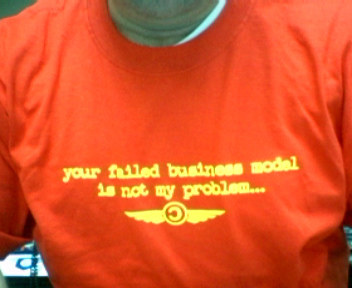
Chris Mottes CEO of independent Danish developer Deadline Games has given a very interesting interview. In it he rails against the current industry business model and how it stifles the industry. Firstly he mentions the huge cost of entry that I have mentioned before on here:
“[The cost] just to develop the concept to a point where publishers will take an interest is huge.†Factor in the “safety net of having your own technologyâ€, as Deadline does, “and that increases the cost incredibly. By the time you’re presenting a project [to prospective publishers] on a next-gen platform you’re spending at least a couple of million dollars as a studio.”
It is fairly obvious that this huge barrier stifles innovation by making everyone risk averse. Two million dollars is a lot to lose on a concept if nobody is interested in publishing your game. He then goes on to point out, quite rightly, how the film industry has a much more mature view and that it is surprising that the big publishers haven’t adopted it:
“The fact that more and more publishers are becoming publicly traded would have meant that publishers would start to see the sense, as the film industry did many years ago, in having independent developers that are actually profitable and have a good chance of surviving.â€
You can see what he is talking about when you look at how many independent developers have gone out of business or sold out. The numbers are quite frightening. He reinforces his view with the following:
“I have to worry about the fact that this industry is so immature commercially that it sticks hard and fast to a model which crushes the innovative independents forces. “
This is so true and harms the industry and the customer. We need innovation to go forward. He concludes with how he would like to see the industry go forward:
“As entertainment products become more and more complex and commercially onerous you need to build models that allow for the existence of those independent forces that create the IPs”
It is a great interview and I recommend that you read it in full. The fault, ultimately lies with the platform holders. They have created a publishing world that favours blockbuster sequels and film tie ins. Whilst what the industry need is to mature and give our customers a wide range of entertainment experiences. This can only come from innovation and experimentation, yet our business model doesn’t allow for this. So everyone loses.
Permalink
Nice interview, which I mostly agree with. I’ve been banging on about the same thing for years, to anyone who’ll listen. Video games have the potential to stand alongside movies, books, and music, but only if we allow and support the creation of new IP. As it stands, the video game industry is in danger of being not much more than just a merchandising arm of those other media industries, and the sports and toy industries.
I think the only point where I disagree is with his call for video games to be more ‘cinematic’. There’s a place for cinematic, lush, narrative driven video games, but to work well these tend to be expensive productions. Not only are expensive games not the answer to lack of original IP, aping or overlapping with the cinematic experience is not the best way to jostle video games into an equivalent position to the other media industries.
I think playing up the unique aspects of video games is more useful – interactivity, playabilty (I’m running out of words already because we don’t have a developed language for video game concepts). Trying to make movies with a degree of interactivity is best left to 1st party studios and big budget developers. The problem for the rest of us, both in terms of economic survival, and improving the industry as a whole, is best solved by making smaller, cheaper, uniquely video game experiences, rather than wasting all our money trying to look like hollywood movies, and following the red-herring of ‘narrative’.
Permalink
Narrative is great, but a number of “blockbusters of all times” don’t need them much – Super Mario Bros., Tetris, Bejeweled, Katamari Damaci, Brain Train, the list goes on. So I guess looking like Hollywood movies isn’t always the best answer.